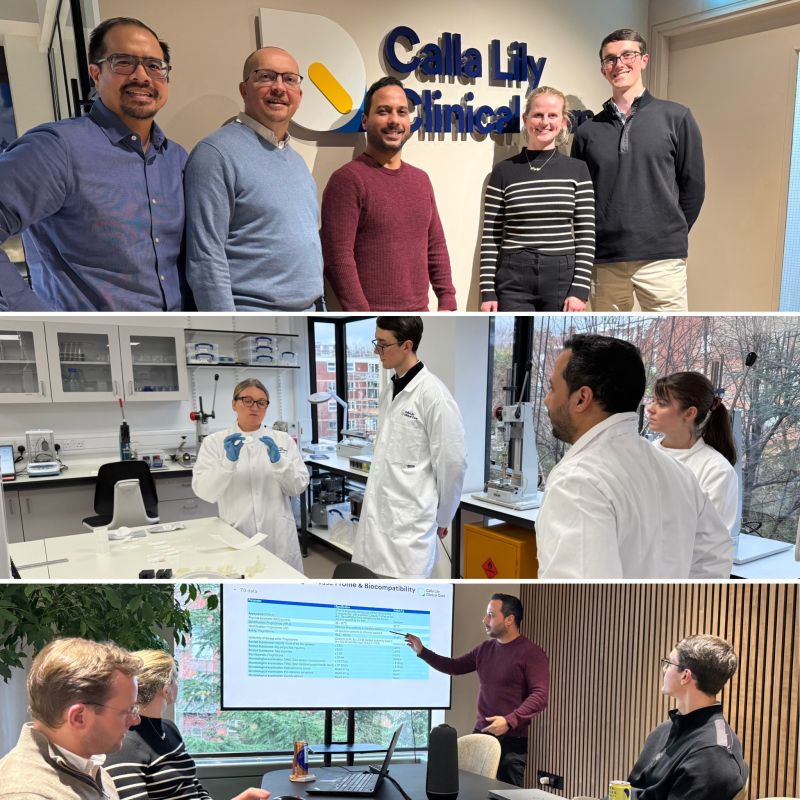The Memo: CLCC Developing Callavid as the Essential Drug Delivery Platform for Women

Under the direction of co-founders Dr Lara Zibners and Thang Vo-Ta is reimagining vaginal drug delivery with its CallavidⓇ device—engineering a next-generation platform that improves both clinical outcomes and patient experience in women’s health.
“Our revolutionary Callavid platform hugely increases the possibilities for intravaginal drug delivery by enabling treatments with enhanced efficacy, lower drug doses, and minimized side effects,” said Vo-Ta.
With its pioneering drug-device combination product, NIHR-funded clinical trial shortly underway, and a platform approach initially addressing miscarriage, IVF, and vaginal microbiome disorders, Calla Lily is redefining what it means to put women’s needs first in medical innovation.
Origin Story
The idea for Calla Lily Clinical Care was born from personal experience. Dr. Lara Zibners, a board-certified pediatrician and emergency medicine specialist, had gone through seven rounds of IVF—all of which had failed. Each cycle involved either painful intramuscular injections or leaky vaginal pessaries that caused anxiety, inconvenience, and uncertainty.
“Every single woman who goes through this process, when opening the progesterone needle or pessary, thinks ‘there HAS to be a better way,’” Zibners said. “Well, we have that better way.”
Zibners partnered with Thang Vo-Ta, a former Goldman Sachs private equity investor and serial entrepreneur, who first developed an earlier version of Callavid as an FDA-cleared leak-free period care tampon-pantyliner combination.
The realization that their technology could transform drug delivery for critical women’s health conditions led them to establish Calla Lily Clinical Care, combining Zibners’ medical expertise with Vo-Ta’s business acumen to create a company dedicated to revolutionizing women’s health.
The company is a Certified B Corp and is based in London, UK.
The Current Landscape
Current methods of drug delivery for indications in fertility, pregnancy, and various gynecological conditions are profoundly inadequate for millions of women worldwide. The vaginal route offers multiple medical benefits and can avoid painful daily injections, but existing products are flawed and cause substantial anxiety and inconvenience for patients at an already distressing time.
Over 150,000 women in the UK alone could benefit from progesterone therapy for threatened miscarriage each year. Globally, approximately 8.5 million women use progesterone for IVF and miscarriage prevention, while another 18.5 million could benefit from its use in preventing preterm birth and preeclampsia.
The current standards of care present significant challenges:
- In the EU/UK: Vaginal pessaries leak substantially—often five times more than the volume of the drug itself.
- In North America: Patients endure very painful intramuscular injections.
- Other options like gels, tablets, and capsules have their own limitations in effectiveness and convenience.
A 2021 UK medical guideline now recommends 400mg vaginal progesterone twice daily for up to 80 days to reduce miscarriage risk. Similar guidelines have since been adopted in Australia, Ireland, and other countries; however, the uncertainty and inconvenience of leaky pessaries cause most women to lie down for an extended period after inserting each pessary. According to health economists from the London School of Economics’ Care Policy and Evaluation Centre (CPEC), the avoidable cost to the British economy and the NHS from the use of leaky progesterone pessaries for miscarriage prevention and IVF across England and Wales is £236 million ($313 million) per year.
Inside the Innovation
Calla Lily’s Callavid device is a robustly patented drug-delivery platform that enables clean and hygienic delivery of medications. The solution is designed to address every pain point in the current standard of care. It provides leakage protection, placement and dosage confidence, comfort and convenience, mess-free insertion and removal, and reduced variability in drug absorption.
The initial focus is a 400mg progesterone Callavid for IVF luteal phase support and threatened miscarriage; However, the platform’s versatility makes it suitable for delivering a wide range of existing and upcoming vaginal therapeutics including for gynecological cancers and live biotherapeutic products (LBPs) to restore and maintain a healthy vaginal microbiome and reduce the growth of antimicrobial resistance (AMR).
What sets Callavid apart is its user-centric design that acknowledges both the medical necessity and emotional impact of drug delivery in women’s health. By eliminating leakage, the device removes a significant source of stress and uncertainty during critical treatment periods.
Progress and Milestones
Clinical trials for Callavid are set to begin in the second half of 2025, with a pivotal bioequivalence trial planned for 2026. Once approved, it will be the world’s first drug-device combination product to treat threatened miscarriage.
Calla Lily Clinical Care has made significant progress in bringing its innovation to market. The company has:
- Secured £1 million ($1.3 million) from the NIHR to initiate clinical feasibility studies.
- Received FDA (510k) clearance of the underlying consumer technology.
- Proprietary high-volume machinery and automation know-how in place.
- Confirmed regulatory pathway with the UK regulator (MHRA), with EMA and FDA pathways to follow.
- Patents granted across Europe, the U.S., Canada, Japan, South Korea, Singapore, China, India, and Brazil.
The company is currently raising pre-Series A funding to support clinical trials and advance its R&D pipeline.
Market Insights
Callavid is built to serve an initial $22+ billion total addressable market, including:
- $2.7 billion in IVF and miscarriage-related progesterone delivery
- $5.5 billion in preterm birth and preeclampsia prevention
- $14.7 billion for microbiome-related therapies LBPs, including for recurrent bacterial vaginosis (BV)
Beyond the initial focus on progesterone delivery, the platform technology opens possibilities for a further $36+ billion total addressable market with:
- New indications, such as the treatment of pre-cancerous cervical lesions, HPV infections, and endometriosis.
- Local hormone replacement therapies (HRT) for menopause with fewer side effects.
- Other women’s health conditions, including vaginal candidiasis and vulvovaginal atrophy.
- An extension into men’s health for rectal medications (granted patents include rectal delivery).
Callavid will act as a backbone for multiple therapeutics, enabling drug-device combinations that bring better care to millions globally.
Join Us at LSI Asia ‘25
CEO Thang Vo-Ta has been selected to present at LSI Asia ‘25 (June 10-13) in front of hundreds of global medical technology companies.
Calla Lily’s presence at LSI signals its growing ambition to serve not only Europe but also Asia-Pacific and global markets. The team is looking to build new commercial, clinical, and investor relationships to support upcoming trials and broaden the use cases of its versatile drug-delivery platform.
Join us in welcoming Thang to the event in Singapore (his hometown), where he will share the latest updates on Calla Lily Clinical Care’s groundbreaking Callavid platform and development roadmap.




